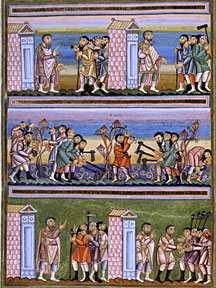The Parables of Christ, Part V: Parable of the Workers in the Vineyard
 by Fr. James B. Buckley, FSSP
by Fr. James B. Buckley, FSSP
From the April 2011 Newsletter
The Gospel selected by the Church for Septuagesima Sunday is taken from Matthew 20:1–16, the parable of the workers in the vineyard. Since the season before Easter represents the time of trial and temptation of this passing world, this Gospel encourages us to labor manfully for the one thing necessary, the salvation of our souls.
In the parable a householder goes out five times in a single day to recruit workers for his vineyard. Only the group he meets the first time are hired for the agreed upon wage of a denarius. Those employed at the third, sixth and ninth hours are told that he will give them “what is just.” To those he finds at the eleventh hour he says, “Go you also into my vineyard. And when evening was come, the lord of the vineyard saith to his steward: call the laborers and pay them their hire, beginning from the last even to the first” (Matt. 20:7–8).
Seeing that those who worked only an hour were given a denarius, the ones employed first expected more but were bitterly disappointed when they also received a denarius. They complained against the master, “Saying: These last have worked but one hour and thou hast made them equal to us that have borne the burden of the day and the heats. But he answering said to one of them: Friend, I do thee no wrong: didst thou not agree with me for a denarius? Take what is thine, and go thy way: I will give to this last even as to thee. Or is it not lawful for me to do what I will?”
In paying those who came last a denarius for their labor, the owner of the vineyard displays his generosity. One commentator suggests, not without reason, that the householder was moved by kindness because he knew that the payment of anything less than a denarius, would not relieve the necessities of the laborer and his family.
What is the point of comparison between this image and the kingdom of heaven? It is suggested by the reaction of those who complained to the householder. They expected to receive more than the others because they had worked longer and endured more difficulties. By granting a denarius to those who worked a single hour, however, the householder shows that the work done is not the exclusive determinant.
So also in the kingdom of heaven, the Lord God, who sees the love which inspires men’s good works, even though these appeared insignificant in comparison to those of others, may reward equally those who worked a brief time with great love and those who worked a longer time with lesser love. “The decisive factor,” Father Leopold Fonck, S.J., observes “is the interior grace and co-operation on the part of man.”
We are not to conclude that there is no difference of degree among those who are saved, nor should we think that God rewards capriciously. He orders all things and judges all men most wisely. The point made in this parable is that those whom men, who can not see everything, judge to be first in the kingdom of heaven may be last and those, whom they consider last may be first. As God revealed to Samuel when the prophet thought Eliab would be the Lord’s anointed: “Man sees those things that appear, but the Lord beholds the heart” (I Kings 16:7).
Many things in this parable have their counterpart in the supernatural realm. The householder denotes Christ who will reward the just with the crown of eternal life. The time of the payment represents the general judgment when everyone will see the rewards and punishments given to others. The denarius signifies the eternal reward and the workers those who are saved.
The complaint of those paid last has no counterpart but is mentioned for the sake of the parable’s realism. In heaven all the just will rejoice over the happiness of others; envy will have no place.
Finally, a comment by Saint Augustine deserves mention. He says that those asked to go into the Lord’s vineyard early in the morning must not say: “Why should I tire myself out when I can go at the last hour and receive the same reward? When you are called, come. The reward promised is indeed the same but the great question concerns the hour of working. No one promised you that you will live until the eleventh hour. Take care lest what he by promising is prepared to give you, you by deferring
take away from yourself.”
April 5, 2011








